16th Destruction of Sized
Narcotic Drugs, Poppy seeds, precursor chemical and paraphernalia (7 June,2002),
Lashio, Shan State (North).
The Destruction Ceremony of
poppy seeds, seized narcotic drugs, precursor chemicals and paraphernalia handed
over to the authorities by farmers of Shan State (North) and organized by the
Central Committee for Drugs Abuse Control, was held at the sports grounds in
Lashio, Shan State (North), on 7 June morning, attended by Chairman of the Work
Committee for Development of Border Areas and National Races Secretary-1 of the
State Peace and Development Council Lt-Gen Khin Nyunt.
Also present on the occasion were Chairman of Shan State (North) Peace and
Development Council Commander of North-East Command Brig-Gen Myint Hlaing,
Chairman of CCDAC Minister for Home Affairs Col Tin Hlaing, Vice-Chairman
Minister for Foreign Affairs U Win Aung, the ministers, the Chief of Staff
(Navy), the deputy ministers, officials of the State Peace and Development
Council Office, departmental heads, the resident representative of UNDCP, the
Japanese Ambassador, Charges d’ Affaires ai of the embassies of the United
States and the People’s Republic of China, local authorities, departmental
personnel, national race leaders of Special Region-1 Kokang Region, Special
Region-2 Wa Region, Special Region-3 Shan Region, Special Region-5 Kachin Region
and Special Region-7 Palaung Region of Shan State (North), representatives of
peace groups, Secretary of Myanmar Correspondents Club U Nyunt Tin, member
correspondents, correspondents of foreign news agencies, members of the Union
Solidarity and Development Association, Maternal and Child Welfare Association,
War Veterans Organization, Red Cross and Auxiliary Fire Brigades, nurses,
traditional cultural troupes, students, guests and local people.
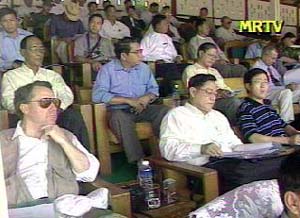
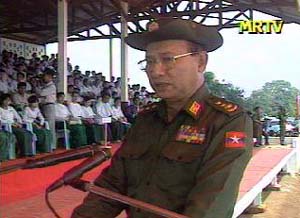
CCDAC Chairman Minister for Home
Affairs Col Tin Hlaing delivered an address.
Professor Daw Myint Myint Than of English Department of
Lashio Degree College and Daw Than Than Htay of Lashio Basic Education Middle
School No 3 acted as masters of ceremonies. CCDAC Chairman Minister for Home
Affairs Col Tin Hlaing delivered an address. He said:
I believe that the occasion today is significant and will
remain as a milestone in the history of Myanmar’s efforts to prevent the
narcotic drugs.
It is all known that the cultivation of opium poppy in Myanmar is the
treacherous legacy left by the colonialism of the past. Even after regaining
independence and on account of divide and rule policy of the colonialists, the
insurgents came into existence. The insurgency, cultivation, production of
opium, drug trafficking became inseparable elements in the past. Although
attempts had been made by successive governments resorting to military,
political, negotiation and other ways and means to solve this problem, it was
far from achieving successful results.
It is an undeniable fact in history that two kinds of legacy
inherited in the era of colonialism of the past such as armed insurrection of
the national races and the production of opium has made the ill-famed activities
to prolong and open opportunities to external interventions so much so that it
has developed from the production of ordinary opium into that of highly
concentrated heroin products. After the Tatmadaw Government took over the State
power in 1988, the policy of national unity was laid down stressing priority in
national solidarity, development of the border regions and the national races.
As a result of realizing the Government’s objectives with sincere intentions,
17-armed insurgent groups have come back into the legal fold. This unprecedented
success laid open for the first time in the post-independence period,
opportunities and access to all round development programmes in the entire
country and fulfillment of the basic needs of the inhabitants of the border
region.
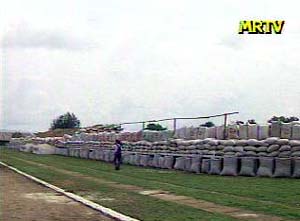
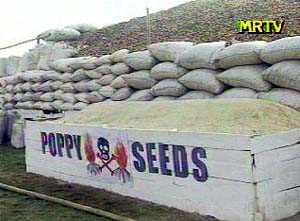
Poppy seeds, seized narcotic drugs and
presursor chemicals seen at the destruction ceremony in Lashio on 7 June.
Since peace and stability were established, access to
far-flung and remote places made possible to carry out prevention and
suppression of opium production. As a result of the changing situation, the
approach and tactics of addressing drug eradication have also changed by
focusing not only on law enforcement activities but coupling with alternative
development programmes.
In accordance to the changing situation, the Government laid
down the following strategy.
Designation of narcotic drug eradication as a national duty
and the comprehensive implementation of that strategy. The development and
enhancement of the standard of living of the national races in the border areas
and the total eradication of poppy cultivation.
To effectively implement the above strategy elimination,
demand elimination and law enforcement tactics are to be utilized.
In addition, the following three techniques are also to be
carried out:
To change the mindset, attitude and upgrade the moral of drug
producers and drug abusers.
To facilitate easy communication and accessibility between
plain and highland dwellers. To develop the economy and social status of the
national races of the border region.
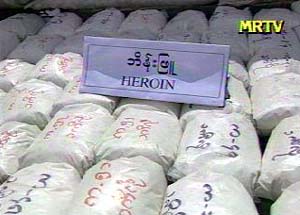
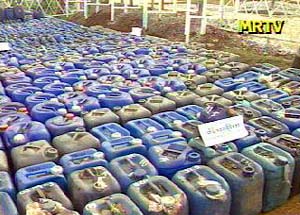
Poppy seeds, seized narcotic drugs and
presursor chemicals seen at the destruction ceremony in Lashio on 7 June.
The drug problems of Myanmar are not only dependent on and
inter-related with stability, peace development and solidarity among the
national races but also mixed with the regional development, education, health,
social, and development of the quality of life of the inhabitants of the
regions. As the eradication of drugs has been carried out focusing on the
development of fundamental needs and infrastructure development, the local
inhabitants and ethnic groups realizing the sincere intentions of the Government
have fully cooperated with the programmes. Mongla Special Region 4 in the
Eastern Shan State, established as an opium free zone in April, 1977 stands
testimony of this successful cooperation.
Acknowledging the Government’s sincere efforts and the
leaders of the ethnic groups have joined hands with the government in
constructing roads, bridges, canals, dams, hydro-power stations and
communications stations as the fundamental items to develop the border region
and the national races as well as development in crop substitution, livestock
breeding for income substitution, education, health sectors with a view to
strengthen solidarity and unity among the ethnic brethrens.
The signs of success affected the Kokang and Wa regions, Consequently, the
leaders of Kokang and Wa with the full support of their peoples have launched
crop substitution and income substitution programmes in their respective regions
to finally get rid of opium production by 2005. The possibilities of success are
inevitable with this sort of setting and full cooperation of the national races
topped by assistance from the Government. This confidence in the national races
is one of the reasons that prompted Senior General Than Shwe to give guidance to
draft a 15-year elimination plan starting 1999-2002 to 2013-2014 fully relying
on our own resources. The 5 projected activities of the 15-year plan are supply
and demand elimination of narcotic drugs, organizing the participation of the
local populace, law enforcement and international cooperation.
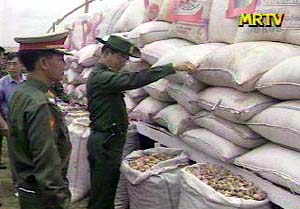
Secretary-1 Lt-Gen Khin Nyunt, guests
diplomats and
correspondents inspect seized narcotic drugs, poppy
seeds and paraphernalia at the destruction ceremony
at the Sports Ground in Lashio on 7 June.
With regard to baseline survey of poppy cultivation in
Myanmar during 1997-98 seasons, there had been 151,201 acres while it dropped to
62,619 acres in 2001-2002 season. Since 1993, Myanmar has jointly conducted 8
Opium Yield Surveys with the United States of America. According to the surveys
so far, it is an undeniable fact that the cultivation and production of opium in
Myanmar has been gradually decreasing.
With regard to annual eradication efforts, 10-988 acres were
destroyed in 1999-2000, 26,114 acres in 2000-2002 and 26,479 acres in 2001-2002.
At present, the Central Committee for Drug Abuse Control has
launched “Project New Destiny” in the regions where poppy cultivation is highly
concentrated like the Northern Shan State, the Southern Shan State and the
Eastern Shan State. The Project calls for prevention of poppy cultivation by
taking action with administrative means, distribution of substitute crop-seeds
for poppy and the control of opium seeds. The opium farmers are asked to grow 7
kinds of alternative crops instead of opium in 21,969 acres of land as a
preventive measures, Substitute seeds are also distributed in time for
cultivation to prevent them from falling back to poppy. To implement the
project, 42.5 million kyats for the Northern Shan State, 5 million kyats for the
Southern Shan State, 2.5 million kyats for the Eastern Shan State, 0.5 million
kyats for Kayah State and 2 million kyats for Kachin State, totalling 52.5
million kyats have been loaned and supported by the Central Committee for Drug
Abuse Control.
While educating
the farmers to grow substitute crops instead of poppy, substitute crop seeds
that are appropriate to the areas and climate are distributed for cultivation on
the other hand, On realizing the sincere intentions the Government, the opium
farmers, on their own accord, have come up voluntarily to submit opium seeds
they have kept for the next season. To this date, poppy seeds weighing
96,659.507 kilos and dried poppy bulb weighing 76,230.073 kilos in the Northern
Shan State, poppy seeds weighing 2,242.109 kilos in the Southern Shan State,
poppy seeds weighing 92.06 kilos and dried poppy bulb weighing 8.165 kilos in
the Eastern Shan State, poppy seeds weighing
8.165 kilos in the Kayah State and poppy seeds weighing 3,287.229 kilos in
Mandalay Division, making a total of poppy seeds weighing 101,289.07 kilos and dried poppy bulb weighing
76,230.481 kilos totalling 73,696.687 baskets of opium seeds and opium bulb
weighing 120,346.68 kilos have been voluntarily surrendered to the authorities.
In a way, such quantity of seeds that would be grown in over 73,679 acres has
been prevented. The local populace had been active not only in crop substitution
and alternative development activities but also in law enforcement activities
like collecting information, investigation, search and raid of clandestine
refineries.
In Laukkai region, they have formed up drug suppression teams
on their own and from 1st to the 15th of April 2002, a total of 52 paraphernalia
were discovered and seized from the valleys and mountains. It is indication that
the local residents had been fully cooperating with the Government.
With regard to drugs control, Myanmar has been cooperating
very closing with neighbouring countries as well as countries in the sub-region
and region. As per bilateral cooperation, Myanmar and China under the
cross-border cooperation project, liaison offices have been opened in Lweje on
the 31st October 2000 and in Chin Shwe haw on the 11th March 2001 respectively.
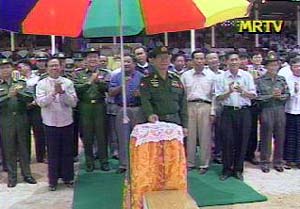
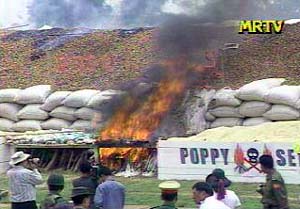
Secretary-1 Lt-Gen Khin Nyunt presses the
button to set fire to the seized narcotic drugs,
poppy seeds and paraphernalia at the Sports Ground in Lashio on 7 June.
Moreover, within 2001 and 2002, Myanmar handed over drug
traffickers wanted in China for 8 times including 13 drug traffickers by the Wa
on their own arrangement. Documents were also handed over once. Such events have
clearly proved that Myanmar is very serious and deeply committed to combat
drugs. Myanmar attaches great importance to cooperation in the region and in the
international arena and the international media has picked up such incidents.
The above presentation in the efforts and success of drug
control covers only some of the activities on Myanmar in cooperation with other
countries.
In conclusion, I would like to express here that this
Destruction Ceremony to destroy the poppy seeds, seized drugs, chemicals and
paraphernalia clearly indicates the result of the commitment and full
cooperation of the local inhabitants. If the local inhabitants are fully
committed and show this sort of cooperation. I am fully confident the drug
scourge threatening the whole mankind will not find a place on the soil of
Myanmar.
Then, Chairman of Shan State (North) Peace and Development
Council Commander of North-East Command Brig-Gen Myint Hlaing explained
endeavors on elimination of narcotic drugs cultivation and production in Shan
State. He said:
I would like to state that today’s Ceremony is different from
the previous occasions because decides narcotic drugs precursor chemicals and
paraphernalias, poppy seeds presented voluntarily by native poppy farmers will
be destroyed.
Myanmar had to face the internal insurgency problem just
after its regain her independence. Insurgency and poppy cultivation and opium
production are so much inter-linked that it is not east to unravel them.
After Myanmar regained her independence, the State could
destroy poppy fields during poppy cultivation season from 1974 to 1988. From
1974 to 1979, the total fields 199,762.87 acres could be destroyed by the Melon,
Hnin Pan, Pauk Pan, Taung Hteik Pan and Hey Man Oo Operations, and Taung Yan
Shin phrase (1) to (4) used aerial spraying from 1981 to 1988.
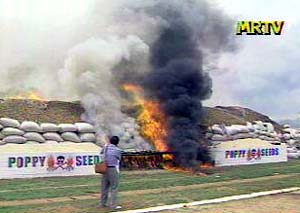
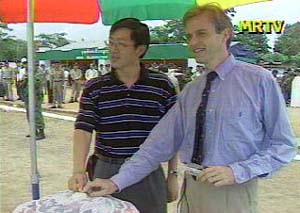
Press the button to set fire to the seized
narcotic drugs,
poppy seeds and paraphernalia at the Sports Ground in Lashio on 7 June.
Owing to the evil legacy of the colonialists, the poor
national races cultivated opium poppy and attempts made by successive
governments to eliminate poppy cultivation, utilizing force had not gained much
success. Now, special programmes with a view to obtain alternative income from
agriculture and animal husbandry are provided to the poppy farmers and the
government and as well as the local national leaders are in full support of
these programmes.
Under the instruction and policy of the government, regional
national groups had made district declaration against narcotic drugs; on the
following dates (26-3-2002) Wa National Groups, on 28-3-2002) Kokang National
Groups and on (4-4-2002) Special Region (3) Shan State (north).
The seizures of narcotic drugs within the region of Northern
Shan State are Heroin (136.98) kilo, Raw Opium 857.18 kilo, Stimulants
(1,066.83) kilo, Ephedrine (277.01), Chemical Liquid (87,200) litres, Chemical
Powder (22,531) kilo, altogether 960 cases and (1,241 criminals.
In 2001, heroin 61.23 kilo, raw opium 1,068.03 kilo,
stimulant 992,91 kilo, Ephedrine 717.5 kilo, Chemical Liquid 142,344 litres,
Chemical Powder 16,345 kilo, altogether 955 cases and 1,224 criminal were
seized. Up to May 31st 2002, heroin 65.92 kilo, raw opium 1,133.76 kilo,
stimulants 80.99 kilo, methamphetamine 415.2 kilo, chemical liquid 21,265.932
litre, chemical powder 2,277.4 kilo, altogether 365 cases and 487 criminals were
seized.
The cultivation and destruction of poppy within the region of
Northern Shan State are in 1999-2000 (63,580) estimated acres were cultivated
and (3,307) acres were destroyed, in 2000-2001 (85,580) estimated acres were
cultivation and (21,319) acres were destroyed; in 2001-2002 (43,266) acres were
cultivated and (17,928) acres were destroyed.
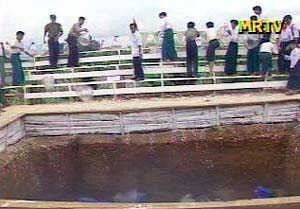
National races, social organizations and
students joyfully
participate in the destruction ceremony of narcotic drugs,
poppy seeds and precursor chemicals in Lashio on 7 June.
The State has now arranged for the poppy cultivation not to
cultivate poppy and urged them to cultivate substitute crops. In Kokang special
region-1, Northern Shan State, at Laukkai District, where substitute crops have
been cultivated, 500 sacks of rice for 2,479 families; 300 sacks of rice for
1,326 families in Kunlon District; altogether 800 sacks of rice have already
been distributed. This year, before poppy cultivating season, poppy cultivators
have been given education to cultivate substitute crops as well as seeds
suitable to the region have already been distributed. Seeds have been
distributed for cultivating 10 kinds of maize which are seasonal Crops of rainy
season and winter, at the fields where the poppy were destroyed. The State has
laid down to use the capital 42.5 million in Kyats to carry out the tasks of
substitute crops cultivation.
In the region, the government make a plan to eliminate the
Opium Cultivation and Production and to present and seize the seeds. In the
region together with the members of the Northern Shan State Peace and
Development Council, members of the Control Committee for Drug Abuse Control,
members of the Tatmadaw and Myanmar Police Force, departmental staff, members of
the Union Solidarity and Development Association, members of Fire Brigade,
members of Red Cross, people’s military and volunteers go to village tracts and
give education the local populace to eliminate the opium poppy cultivation. They
make them give away the poppy seeds and dried poppy capsules to the authority
concerned.
Poppy cultivators had now presented poppy seeds to the
authority concerned according to their will. Up to now 70,249.25 baskets of
poppy seeds, weighing 114,717.03 kilos have been presented. Within those poppy
seeds, 70,249 acres of land can be put under poppy cultivation and can yield 309
tons of raw opium and 31 tons of heroin can be produced. This occasion will be
able to prevent before hand all these opium and heroin.
At this ceremony, I would like to submit the list of seeds,
narcotic drugs, precursor chemicals and paraphernalia; and in Laukkai Township,
we had arranged another ceremony to destroy poppy seed 7,824 baskets, 12,776.6
kilo and narcotic drugs and paraphernalia seized by special region-1 Kokang.
Then, the Secretary-1 and party, guests, the ambassadors and the correspondents
inspected opium seeds presented by farmers and seized narcotic drugs and
chemicals for setting fire at the sports grounds.
Next, Secretary-1 Lt-Gen Khin Nyunt, Commander Brig-Gen Myint
Hlaing, Minister Col Tin Hlaing, national race leaders, Japanese Ambassador Mr
Shigeru Tsumori, Charge d’ Affaires of the US Embassy Miss Priscilla A Clap,
Charge d’ Affaires of the Chinese Embassy Mr Tang Ying, UNDCP Resident
Representative Mr Jean-luc Lemahieu pressed the buttons of the remote controls
to set fire drugs and opium seeds.
Similarly, national race leaders of Special Region-1 Kokang
Region, Special Region-1 Wa Region, Special Region-3 Shan Region, Special
Region-5 Kachin Region, Special Region-7 Palaung Region, peace groups, national
races of Kokang, Wa, Shan, Kachin and Palaung national races, USDA, MCWA, WCWA,
WVO, Auxiliary Fire Brigade and Red Cross, nurses, traditional cultural troupes
and students joyfully participated in the seized narcotic drugs destruction
ceremony.
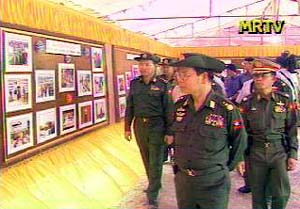
Secretary-1 Lt-Gen Khin Nyunt
views
documentary photos on endeavours on
narcotic drug elimination in Shan State (North).
Then, the Secretary-1 and party and guests inspected drugs,
opium seeds and chemicals being destroyed. Afterwards, the Secretary-1 and party
and the guests viewed the exhibition on documentary photos on endeavors of Shan
State (North).
Today’s seized narcotic drugs destruction ceremony, organized
by CCDAC in Lashio, opium seeds weighing 101,940.43 kilos, 249
kilos of raw opium, 102 kilos of morphine powder, three kilos of morphine solid,
6,131.22 litres of ether, 3,673.18 litres of Acid Anhydride, 407.3 litres of
chloroform, 7,988.22 litres of alcohol, 225 litres of Lysol, 15 litres of
sulphuric acid, 15 litres of acid plus ether, 80 litres of ether plus Lysol, 69
litres of acid plus Lysol, 25 litres of hydrochloric acid, 20 litres of ether
plus chloroform, 70 kilos of Phenyl Acetic Acid, 0.75 litre of acid plus opium
liquid, 557 litres of opium plus Lysol, 50 litres of opium liquid, 545.52 litres
of kerosene, 1,145.2 litres of chemical powder and 23 items of paraphernalia
estimated worth US$ 120 were destroyed.